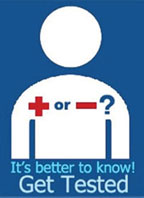
The US Centers for Disease Control and Prevention (CDC) recommend that every individual between the ages of 13 and 64 undergo an HIV test as part of routine medical care. People at high risk of HIV infection – such as those who have had unprotected sex, or who have sex in exchange for money or drugs – are recommended to have an HIV test at least once a year.
There are three main tests that can detect HIV. The most common is the HIV antibody test, which can detect HIV anti-bodies – proteins produced in response to HIV infection – in urine, blood or mouth fluids. This test is not usually carried out until three-six months after potential HIV infection, as it can take this long for antibodies to be produced.
The HIV RNA test, however, may detect whether HIV is present in a person’s blood within nine-11 days of infection, and test results can be available within a few days to weeks.
The Western blot test is usually carried out if results from the HIV RNA or HIV antibody tests are positive. It is used to confirm whether HIV is present in the blood.
There are also two home tests available that have been approved by the US Food and Drug Administration (FDA). One of these involves taking a blood sample and sending it to a laboratory for testing, while the other involves taking a swab of the gums with a device to obtain a sample of oral fluids before inserting the sample into a test solution. If the results of these tests are positive, they must be followed up with a Western blot test.





Be the first to comment